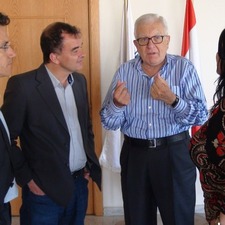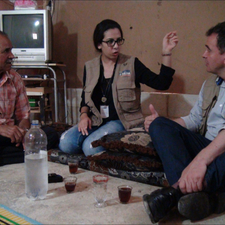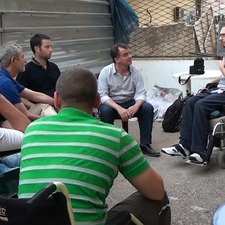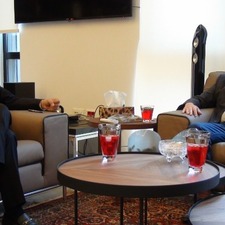The AMB visits Lebanon and undertakes to continue working to assist with the humanitarian crisis of the refugees
| Subject: International Cooperation
The Vice-President for International Affairs and Cooperation of the Metropolitan Area of Barcelona (AMB), Alfred Bosch, made a three-day visit to Lebanon to discover the humanitarian aid projects in which the AMB is involved, in light of the Syrian refugee crisis affecting the country. Accompanied by a team from the MedCities city network, he also conducted interviews with the local Mayors and numerous refugees staying in informal camps in various parts of the country, gaining insight into the difficult living conditions and shortcomings these people are suffering.
ACF has implemented a program for water, hygiene, and sanitation to improve the plumbing situation at the informal camps found in Bekaa, and to thus prevent the constant flooding that occurs during the rainy periods while also improving access to drinking water for refugees.
"Our work is essential because the refugees have been in Lebanon for years and they aren't just passing through", explains Fátima G. Candela, a foreign aid worker with the ACF. "Organizations are doing the most to develop these infrastructures in the informal camps because the State derives all forms of management through the NGOs."
In Lebanon, there are more than one million Syrian refugees, the equivalent of about a quarter of the total Lebanese population. Humanitarian organizations and agencies manage the entire response to the crisis, and the lack of official refugee camps means that the Syrians are scattered throughout the country, in both urban and rural areas.
Alfred Bosch also defended the need to carry out more projects such as the one co-funded by the AMB. "The work has to be done at the source, on the ground." The objective of this water purification program is for a total of 43,500 people to benefit from the construction of new pipelines and the installation of water tanks, both of which are essential for combating the diseases linked to unsafe and contaminated water due to a lack of treatment.
He also stressed that the people of Lebanon should "face the emergency situation involving more than one million refugees. We have to help with basic things such as water, waste management, toilet facilities, and medical assistance, among other things. Not enough is being done here. It is here, in Lebanon, that the maximum efforts must be made."
Bosch was also able to speak with refugees living in Tanayel camp 005, near the town of Zahle, where 225 people are living in 34 tents. The project, funded by the AMB for this area, resolved the constant flooding suffered by the inhabitants for the past 3 years.
On Wednesday, the AMB and MedCities team met with the mayors of the cities of Byblos, Tripoli and Mina. The mayors explained the most urgent needs of these cities, which are now suffering from the instability of their respective regions. The main demands of the mayors are related to the development of tourism, a sector in which Barcelona and the metropolitan area have much experience and may act as a source of income to help alleviate the emergency situation taking place there, in turn opening up opportunities for the inhabitants.
In Tripoli, the second largest city in the country, 65% of the population lives below the poverty line. It is estimated that there are over 150,000 refugees settled in the metropolitan area and, to improve the socio-economic conditions of both the local population and the refugees, it would be necessary to create 70,000 jobs, though the city is only capable of generating 2,000 to 3,000 per year, according to the data provided by the Municipality.
After the meetings, Alfred Bosch stated that "cooperation with the cities of Lebanon is important because there are people here who are suffering a lot and who do not have any chances to improve their situation; we should help them by providing opportunities."
To promote an improvement in the opportunities available to the host population and the refugees, Alfred Bosch and the MedCities team visited an occupational training centre in the city of Sidon on Thursday where the AMB and the Hariri Foundation both participate. They also met with the Mayor of the city to discuss the impact of the massive influx of refugees into the city.
After visiting the two refugee settlements in northern Lebanon, Alfred Bosch also experienced first-hand the extreme living conditions faced by thousands of Syrian families.
Bosch has undertaken to continue working from the AMB to make sure that the refugees have more opportunities, reminding people that "the best way to help is to end the War in Syria and to ensure that those who have been forced to abandon their country may return home."
















































